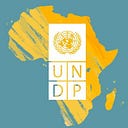A “magic box” provides clean energy and safe water to rural communities in Tanzania
Just like almost any other adolescent girl in rural Tanzania, Rebecca, 13, had to trek over 4 kilometers four times a day to get water for her family’s cooking, drinking and washing.
There is no water pump in Mtavira, her village in the country’s central Singida region, so she had to fetch water from a ditch dug besides the river bank, often sharing it with cattle.
Rebecca’s biggest wish, to have access to water near her home, is about to be granted, with UNDP-supported OffGridBox technology coming to ten districts in Tanzania.. “The day [this happens]…, I will dance with joy!,” she says.


Untapped potential
Tanzania’s vast renewable energy resources are largely untapped. The sun shines between 2,080 to 3,500 hours per year, with a global horizontal irradiance of 4–7 kwh per square meter per day (PDF). Still, a majority of the rural population relies on firewood as its main source of energy, and 16 % of Tanzanians have no electricity.
Also, in spite of the country being surrounded by five major lakes and other water bodies, only a fraction (30%) of the rural population has access to clean and safe water.

UNDP is working with local Government authorities to install the solar-powered boxes in three rural districts (Bunda, Ikungi and Busega). The pilot will then expand further to villages where people either have to buy water or, like Rebecca, walk for the best part of the day to fetch it themselves.
The project is unique in that it also targets isolated islands on Lake Victoria: Sozia, Buyanza and Namuguma always depended on water from the Lake for their daily needs — with the associated risks of waterborne diseases such as diarrhea, dysentery and cholera. In recent years, communities started to rely on bottled water, which poses a high risk of plastic pollution.

An all-in-one solution
A compact solution that fits entirely in a 6x6x6 ft shipping container and is equipped with all the hardware needed to produce electricity and water, the box can charge up to 130 power banks per day, provide up to 1,000 litres of drinking water and can connect to TVs, fans, refrigerators, etc. The box also contributes to the reduction of carbon emission into the atmosphere by reducing the cost of using fuel as a source of energy.
The box is operated by 2 or 3 trained village members who are identified by the village authorities. Their responsibilities ranges from box management, sales, customer care and daily reporting.
Ali Rajabu is one of them :
“ This box has really transformed our lives. We used to buy a litre of water for 1,000 Tshs (about US$1.30), now we pay 200, and the water is clean and safe”.
Hamida Rajab, in Mtavira, is happy with all of the services that the box can provide:
“We charge phones, sell powerbanks, and provide clean and safe water for drinking and general household consumption.”
Improving lives
In Mtavira alone, two boxes have been installed, and six water distribution points and one well built.
Dr. Kitila Mkumbo, Permanent Secretary Ministry of Water and Irrigation, inaugurated the installation by applauding efforts in ensuring rural Tanzanians got access to basic services such as clean energy and safe water: “ UNDP has been at the forefront in supporting the Government and they often reach the remote place first even before the Government. We thank them for supporting this much needed project.”
And for children like Rebecca, dropping out of school and trekking long and risky hours in search of water is now a thing of the past.


Text and photos: UNDP Tanzania
